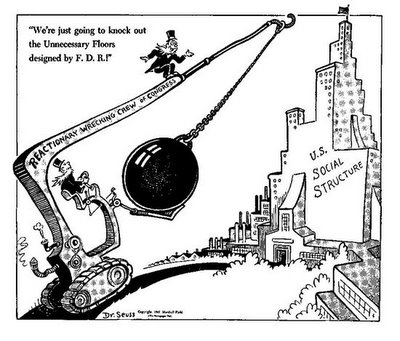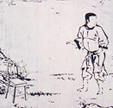Strange Notions from Disturbed Individuals
After two invasions, we are occupying Iraq. The current administration has taken the position that in time of war, certain presidential decisions are unreviewable by Congress or the courts. Two new judges sit on the Supreme Court. The drive to privatize Social Security has stalled temporarily, but its proponents understand that individual battles do not a war make.
 General Dwight David Eisenhower, the Allied Commander in the Atlantic Theater in World War II, certainly knew that. He was later elected President, and he probably still knew that.
General Dwight David Eisenhower, the Allied Commander in the Atlantic Theater in World War II, certainly knew that. He was later elected President, and he probably still knew that.
On the left side of the accompanying photo, Arthur Eisenhower is holding Roy. On the right side, Edgar is standing behind Dwight. In later years, Dwight corresponded with Edgar; and they discussed many issues. Below are excerpts from a letter to Edgar dated November 8, 1954. For some reason, it sounds disturbingly familiar today. What is the system of checks and balances in government? What are the powers and responsibilities of government in a democracy?
Dear Ed,
I think that such answer as I can give to your letter of November first will be arranged in reverse order — at least I shall comment first on your final paragraph.
You keep harping on the Constitution; I should like to point out that the meaning of the Constitution is what the Supreme Court says it is. Consequently no powers are exercised by the Federal government except where such exercise is approved by the Supreme Court (lawyers) of the land…
Now it is true that I believe this country is following a dangerous trend when it permits too great a degree of centralization of governmental functions. I oppose this — in some instances the fight is a rather desperate one. But to attain any success it is quite clear that the Federal government cannot avoid or escape responsibilities which the mass of the people firmly believe should be undertaken by it. The political processes of our country are such that if a rule of reason is not applied in this effort, we will lose everything — even to a possible and drastic change in the Constitution. This is what I mean by my constant insistence upon “moderation” in government. Should any political party attempt to abolish social security, unemployment insurance, and eliminate labor laws and farm programs, you would not hear of that party again in our political history. There is a tiny splinter group, of course, that believes you can do these things. Among them are H. L. Hunt (you possibly know his background), a few other Texas oil millionaires, and an occasional politician or business man from other areas. Their number is negligible and they are stupid.
…A year ago last January we were in imminent danger of losing Iran, and sixty percent of the known oil reserves of the world. You may have forgotten this. Lots of people have. But there has been no greater threat that has in recent years overhung the free world.
…You also talk about "bad political advice" I am getting. I always assumed that lawyers attempted accuracy in their statements. How do you know that I am getting any political advice?…[W]hy don’t you just assume I am stupid, trying to wreck the nation, and leave our Constitution in tatters?
That’s quite a letter, isn’t it? Dwight still held quaint beliefs that the people play some role in a democracy and the Supreme Court decides the constitutionality of laws. What was he thinking? Recent events have convincingly demonstrated that if you simply keep controversial activities out of the legal system entirely, courts cannot review them!
Besides, Republicans don’t believe in Eisenhower anymore. His Farewell Address to the nation warned of the growing military-industrial complex; in early drafts of the speech, he called it the military-industrial-Congressional complex — a formulation which more directly pointed at federal corruption. But right-wing historian Paul Johnson, the author of Modern Times, declared the complex “largely mythic.” And even if it wasn’t mythic, it evidently didn’t prevail since, as President Ronald Reagan explained:
You have to remember, we don’t have the military industrial complex that we once had, when President Eisenhower spoke about it. (1/5/1983)
Which leads me to Theodor Seuss Geisel. In the 1920s and 30s, he produced advertising artwork for Ford, General Electric, N.B.C., and other companies. Then he began drawing editorial cartoons — hundreds of them. In World War II, he worked on propaganda for the Army, which found animated movies to be an effective means of indoctrinating enlisted men.
Yes, Dr. Seuss wrote childrens’s books — Horton Hears a Who (an allegory about occupied Japan) and Yertle the Turtle (about Hitler). He also penned The Cat in the Hat (freedom and responsibility) and The Lorax (protecting the environment). Geisel was a complex man. Along with buck-toothed images of slanty-eyed Japs squinting through thick glasses, he created cartoons against racism and anti-Semitism. And in 1942, he drew this:
 Reactionaries in Congress swinging a wrecking ball at the social structure of America? Ridiculous, isn’t it?
Reactionaries in Congress swinging a wrecking ball at the social structure of America? Ridiculous, isn’t it?
____________________
 General Dwight David Eisenhower, the Allied Commander in the Atlantic Theater in World War II, certainly knew that. He was later elected President, and he probably still knew that.
General Dwight David Eisenhower, the Allied Commander in the Atlantic Theater in World War II, certainly knew that. He was later elected President, and he probably still knew that.On the left side of the accompanying photo, Arthur Eisenhower is holding Roy. On the right side, Edgar is standing behind Dwight. In later years, Dwight corresponded with Edgar; and they discussed many issues. Below are excerpts from a letter to Edgar dated November 8, 1954. For some reason, it sounds disturbingly familiar today. What is the system of checks and balances in government? What are the powers and responsibilities of government in a democracy?
Dear Ed,
I think that such answer as I can give to your letter of November first will be arranged in reverse order — at least I shall comment first on your final paragraph.
You keep harping on the Constitution; I should like to point out that the meaning of the Constitution is what the Supreme Court says it is. Consequently no powers are exercised by the Federal government except where such exercise is approved by the Supreme Court (lawyers) of the land…
Now it is true that I believe this country is following a dangerous trend when it permits too great a degree of centralization of governmental functions. I oppose this — in some instances the fight is a rather desperate one. But to attain any success it is quite clear that the Federal government cannot avoid or escape responsibilities which the mass of the people firmly believe should be undertaken by it. The political processes of our country are such that if a rule of reason is not applied in this effort, we will lose everything — even to a possible and drastic change in the Constitution. This is what I mean by my constant insistence upon “moderation” in government. Should any political party attempt to abolish social security, unemployment insurance, and eliminate labor laws and farm programs, you would not hear of that party again in our political history. There is a tiny splinter group, of course, that believes you can do these things. Among them are H. L. Hunt (you possibly know his background), a few other Texas oil millionaires, and an occasional politician or business man from other areas. Their number is negligible and they are stupid.
…A year ago last January we were in imminent danger of losing Iran, and sixty percent of the known oil reserves of the world. You may have forgotten this. Lots of people have. But there has been no greater threat that has in recent years overhung the free world.
…You also talk about "bad political advice" I am getting. I always assumed that lawyers attempted accuracy in their statements. How do you know that I am getting any political advice?…[W]hy don’t you just assume I am stupid, trying to wreck the nation, and leave our Constitution in tatters?
That’s quite a letter, isn’t it? Dwight still held quaint beliefs that the people play some role in a democracy and the Supreme Court decides the constitutionality of laws. What was he thinking? Recent events have convincingly demonstrated that if you simply keep controversial activities out of the legal system entirely, courts cannot review them!
Besides, Republicans don’t believe in Eisenhower anymore. His Farewell Address to the nation warned of the growing military-industrial complex; in early drafts of the speech, he called it the military-industrial-Congressional complex — a formulation which more directly pointed at federal corruption. But right-wing historian Paul Johnson, the author of Modern Times, declared the complex “largely mythic.” And even if it wasn’t mythic, it evidently didn’t prevail since, as President Ronald Reagan explained:
You have to remember, we don’t have the military industrial complex that we once had, when President Eisenhower spoke about it. (1/5/1983)
Which leads me to Theodor Seuss Geisel. In the 1920s and 30s, he produced advertising artwork for Ford, General Electric, N.B.C., and other companies. Then he began drawing editorial cartoons — hundreds of them. In World War II, he worked on propaganda for the Army, which found animated movies to be an effective means of indoctrinating enlisted men.
Yes, Dr. Seuss wrote childrens’s books — Horton Hears a Who (an allegory about occupied Japan) and Yertle the Turtle (about Hitler). He also penned The Cat in the Hat (freedom and responsibility) and The Lorax (protecting the environment). Geisel was a complex man. Along with buck-toothed images of slanty-eyed Japs squinting through thick glasses, he created cartoons against racism and anti-Semitism. And in 1942, he drew this:
 Reactionaries in Congress swinging a wrecking ball at the social structure of America? Ridiculous, isn’t it?
Reactionaries in Congress swinging a wrecking ball at the social structure of America? Ridiculous, isn’t it?____________________
Labels: Dwight Eisenhower, Paul Johnson, Ronald Reagan, Theodor Seuss Geisel


0 Comments:
Post a Comment
<< Home